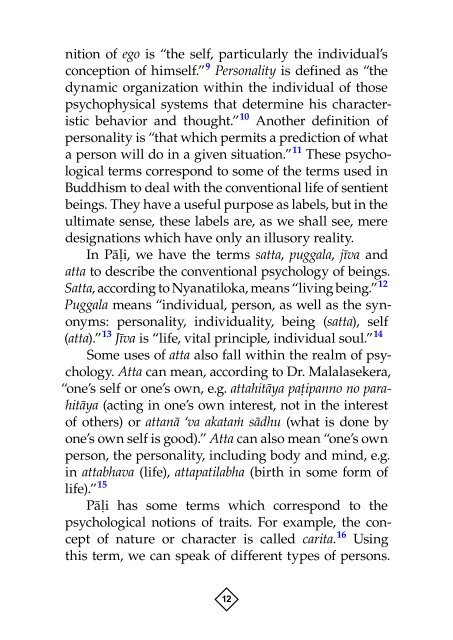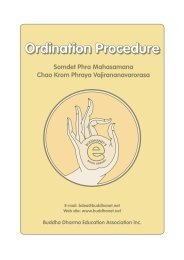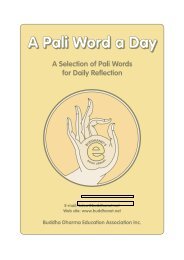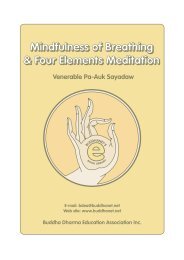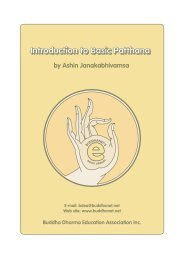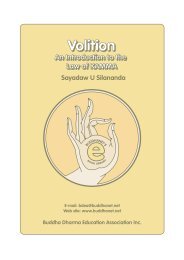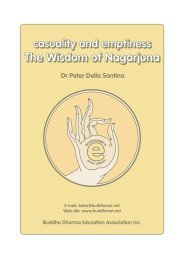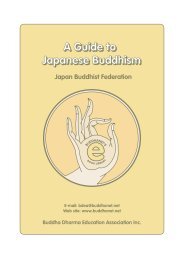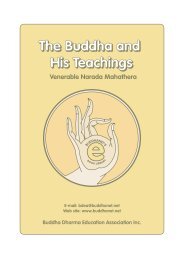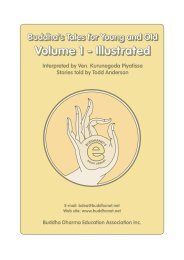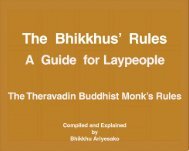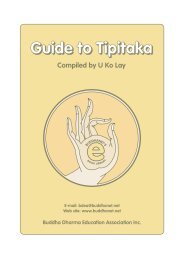No Inner Core: An Introduction to the Doctrine of Anatta - BuddhaNet
No Inner Core: An Introduction to the Doctrine of Anatta - BuddhaNet
No Inner Core: An Introduction to the Doctrine of Anatta - BuddhaNet
Create successful ePaper yourself
Turn your PDF publications into a flip-book with our unique Google optimized e-Paper software.
nition <strong>of</strong> ego is “<strong>the</strong> self, particularly <strong>the</strong> individual’s<br />
conception <strong>of</strong> himself.” 9 Personality is defined as “<strong>the</strong><br />
dynamic organization within <strong>the</strong> individual <strong>of</strong> those<br />
psychophysical systems that determine his characteristic<br />
behavior and thought.” 10 <strong>An</strong>o<strong>the</strong>r definition <strong>of</strong><br />
personality is “that which permits a prediction <strong>of</strong> what<br />
a person will do in a given situation.” 11 These psychological<br />
terms correspond <strong>to</strong> some <strong>of</strong> <strong>the</strong> terms used in<br />
Buddhism <strong>to</strong> deal with <strong>the</strong> conventional life <strong>of</strong> sentient<br />
beings. They have a useful purpose as labels, but in <strong>the</strong><br />
ultimate sense, <strong>the</strong>se labels are, as we shall see, mere<br />
designations which have only an illusory reality.<br />
In Pàëi, we have <strong>the</strong> terms satta, puggala, jãva and<br />
atta <strong>to</strong> describe <strong>the</strong> conventional psychology <strong>of</strong> beings.<br />
Satta, according <strong>to</strong> Nyanatiloka, means “living being.” 12<br />
Puggala means “individual, person, as well as <strong>the</strong> synonyms:<br />
personality, individuality, being (satta), self<br />
(atta).” 13 Jãva is “life, vital principle, individual soul.” 14<br />
Some uses <strong>of</strong> atta also fall within <strong>the</strong> realm <strong>of</strong> psychology.<br />
Atta can mean, according <strong>to</strong> Dr. Malalasekera,<br />
“one’s self or one’s own, e.g. attahitàya pañipanno no parahitàya<br />
(acting in one’s own interest, not in <strong>the</strong> interest<br />
<strong>of</strong> o<strong>the</strong>rs) or attanà ‘va akataÿ sàdhu (what is done by<br />
one’s own self is good).” Atta can also mean “one’s own<br />
person, <strong>the</strong> personality, including body and mind, e.g.<br />
in attabhava (life), attapatilabha (birth in some form <strong>of</strong><br />
life).” 15<br />
Pàëi has some terms which correspond <strong>to</strong> <strong>the</strong><br />
psychological notions <strong>of</strong> traits. For example, <strong>the</strong> concept<br />
<strong>of</strong> nature or character is called carita. 16 Using<br />
this term, we can speak <strong>of</strong> different types <strong>of</strong> persons.<br />
12


